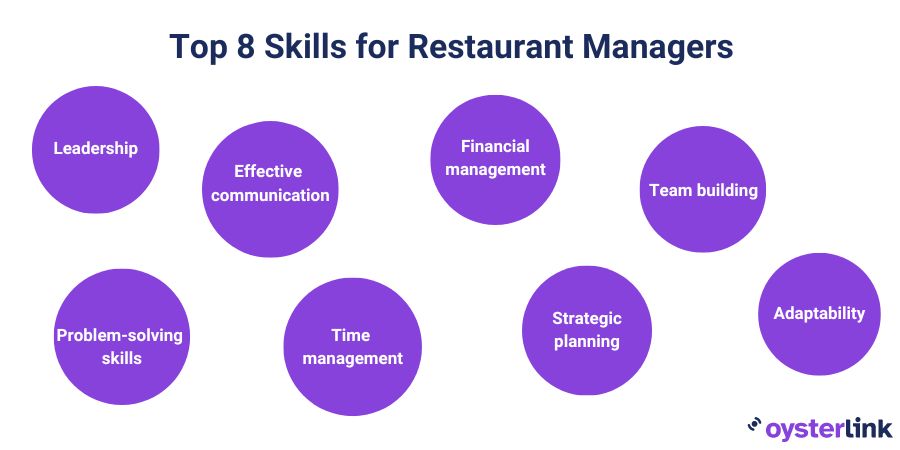How Much Does a Restaurant Manager Make in the United States?
The average base salary for a Restaurant Manager in the United States is a month or $69,580 per year, according to the Bureau of Labor Statistics (BLS).
Average Restaurant Manager Base Salary:
The average wage for a Restaurant Manager is $33.45 per hour.
Some Restaurant Managers can earn as little as $42,990 (10th percentile) a year, while others may earn as much as $101,240 (90th percentile) a year.
[Source: BLS]
This chart is interactive. Hover your mouse over different parts of the chart to see detailed data.
If you’re in the 90th percentile, you earn more than 90% of all the Restaurant Managers in the United States. Meanwhile, if you’re in the 10th percentile, you earn less than 90% of the group.
Annual Mean Wage of Restaurant Managers by State
[Source: BLS]
This map is interactive. Hover your mouse over different parts of the map to see detailed data.
The annual earnings for Restaurant Managers can vary significantly depending on the state they work in. For example, in states with high living expenses such as New York or Washington, Restaurant Managers typically earn higher salaries to cope with the increased cost of living.
On the other hand, in states like Tennessee or Montana, where the cost of living is lower, Restaurant Manager salaries may be more modest.
Moreover, states boasting famous tourist attractions or vibrant entertainment scenes, such as California or Florida, may offer more attractive wages to attract experienced Restaurant Managers.
Factors That Affect Average Restaurant Manager Salary
Aside from geographic location, here are other factors that influence the average Restaurant Manager salary:
Size and Type of Establishment
Restaurant Managers working in large, high-end establishments or restaurant chains may command higher salaries compared to those in smaller, independent restaurants.
Level of Experience
Experienced Restaurant Managers with a proven track record of success in the industry often earn higher salaries than those just starting their careers.
Education and Training
Restaurant Managers with advanced degrees or certifications in hospitality management may qualify for higher-paying positions within the industry.
Performance and Achievements
Exceptional performance, such as exceeding sales targets, improving operational efficiency or receiving industry awards, can lead to salary increases and advancement opportunities for Restaurant Managers.
Additional Responsibilities
Restaurant Managers who take on additional responsibilities, such as overseeing multiple locations, managing special events or implementing new initiatives, may receive higher compensation packages.
Cost of Living
The cost of living in the area where a Restaurant Manager works can significantly impact their salary, with higher costs often correlating to higher wages to maintain a comparable standard of living.
Restaurant Manager Salary in Major US Cities
Among the four major U.S. cities listed below, New York City is the top-paying city for Restaurant Managers, followed by Miami, Los Angeles and Chicago.
Annual mean wage
$81,170
# of employees
5,530
Annual mean wage
$90,180
# of employees
15,090
Annual mean wage
$68,770
# of employees
9,320
Annual mean wage
$69,120
# of employees
15,220
[Source: BLS]
High-Paying Cities for Restaurant Managers
| City | Avg Salary | Avg Hourly Wage |
|---|---|---|
| Miami, FL | 81,170 | 39.02 |
| Chicago, IL | 68,770 | 33.06 |
| NYC, NY | 90,180 | 43.36 |
| Los Angeles, CA | 69,120 | 33.23 |
Average Restaurant Manager Salary by State
Restaurant Managers in Washington, New Jersey, New York, Colorado and Massachusetts earn the highest average salaries, while those in Tennessee, Mississippi and West Virginia earn the lowest.
| State | Avg. Salary |
|---|---|
| Washington | $87,340 |
| New Jersey | $85,800 |
| New York | $84,500 |
| Colorado | $82,850 |
| Massachusetts | $81,860 |
| Delaware | $81,470 |
| District of Columbia | $81,330 |
| Connecticut | $79,720 |
| Hawaii | $79,320 |
| Vermont | $77,270 |
| Oregon | $76,210 |
| Maryland | $75,330 |
| New Hampshire | $75,090 |
| Minnesota | $74,970 |
| Florida | $72,630 |
| Nebraska | $72,210 |
| California | $71,970 |
| Rhode Island | $71,470 |
| North Carolina | $71,020 |
| Iowa | $69,730 |
| Pennsylvania | $69,540 |
| Nevada | $69,470 |
| Alaska | $69,310 |
| Kansas | $68,720 |
| South Carolina | $68,230 |
| Virginia | $68,070 |
| Maine | $67,990 |
| Ohio | $67,070 |
| Illinois | $66,830 |
| North Dakota | $66,130 |
| Georgia | $65,980 |
| Arkansas | $65,430 |
| Arizona | $65,430 |
| Texas | $65,430 |
| Wisconsin | $65,200 |
| Oklahoma | $64,570 |
| Missouri | $64,420 |
| Indiana | $63,800 |
| Michigan | $63,400 |
| Idaho | $63,390 |
| Kentucky | $62,980 |
| Wyoming | $62,610 |
| New Mexico | $62,170 |
| Louisiana | $61,300 |
| South Dakota | $59,050 |
| Utah | $58,720 |
| Montana | $58,560 |
| Tennessee | $57,770 |
| Mississippi | $56,470 |
| West Virginia | $51,880 |
Non-Monetary Benefits and Perks for Restaurant Managers
In addition to their salary, Restaurant Managers may receive non-monetary perks and benefits designed to enhance job satisfaction, support work-life balance and facilitate professional growth.
- Paid time off (PTO): Generous PTO allowances give Restaurant Managers the opportunity to take time off for vacations, personal days or sick leave without worrying about losing income.
- Health and wellness benefits: Access to health insurance, gym memberships, wellness programs and counseling services can contribute to physical and mental well-being.
- Meal discounts or free meals: Many restaurants offer discounted or complimentary meals to their employees, which can help reduce food expenses and promote loyalty to the establishment.
- Recognition and rewards: Recognizing the hard work and achievements of Restaurant Managers through awards, bonuses or public acknowledgment can boost morale and motivation.
- Employee assistance programs (EAPs): EAPs offer confidential counseling and support services for personal or work-related issues, helping Restaurant Managers cope with stress and improve their overall well-being.
- Travel opportunities: Some restaurant chains may offer travel incentives such as company-sponsored trips, conferences or retreats for Restaurant Managers to network with colleagues and learn about industry trends.
- Employee discounts: Beyond meals, Restaurant Managers may enjoy discounts on restaurant merchandise, catering services or affiliated businesses, providing additional value beyond their salary.
- Health, dental and vision insurance: Access to comprehensive health, dental and vision insurance plans ensures that Restaurant Managers and their families have access to essential healthcare services and treatments.
- 401(k) retirement plans: Offering 401(k) retirement plans with employer contributions allows Restaurant Managers to save for their future and build long-term financial security.
- Family-friendly policies: Offering benefits such as parental leave, childcare assistance or flexible scheduling for caregivers can support Restaurant Managers in balancing their work responsibilities with family commitments.
According to Statista, here are the benefits that employees are seeking and would be willing to change jobs for:
[Source: Statista]
This chart is interactive. Hover your mouse over different parts of the chart to see detailed data.
Top 8 Skills Needed for Restaurant Managers
To excel in their role, Restaurant Managers need to possess a blend of essential skills and attributes that contribute to effective management and the overall success of the establishment. These skills include:
1. Leadership
Restaurant Managers must lead by example, inspiring and motivating their team of Servers, Chefs, Cooks, Bartenders and Bussers to perform at their best. This involves setting clear expectations, providing guidance and fostering a positive work culture where staff feel valued and supported.
2. Communication
Effective communication is essential for a Restaurant Manager to convey instructions clearly to staff, listen to their concerns and address any issues that arise. It also involves communicating with customers to ensure their needs are met and to handle any feedback or complaints professionally.
3. Problem-Solving
Restaurant Managers encounter various challenges, from equipment malfunctions to customer complaints. Being able to think quickly on their feet and find practical solutions is crucial to maintaining smooth operations and ensuring customer satisfaction.
4. Time Management
Managing a restaurant requires juggling multiple tasks and priorities, from staffing schedules to inventory management. Restaurant Managers must prioritize their time effectively to ensure that tasks are completed efficiently and that the restaurant runs smoothly.

5. Financial Management
Restaurant Managers are responsible for managing the restaurant’s finances, including budgeting, cost control and financial reporting. They must monitor expenses, optimize purchasing decisions and analyze financial data to ensure profitability and sustainable growth.
6. Team Building
Building a strong and cohesive team is essential for a Restaurant Manager to ensure smooth operations and provide excellent service. This involves hiring and training staff, fostering a positive work environment and promoting teamwork and collaboration among employees.
7. Adaptability
The restaurant industry is dynamic and fast-paced, so Restaurant Managers must be adaptable and able to handle unexpected challenges and changes. This may include adjusting staffing levels, menu items or operating procedures to meet evolving customer needs and market conditions.
8. Strategic Planning
Restaurant Managers play a key role in developing and implementing long-term strategies to achieve business goals and drive growth. Setting sales targets or adopting marketing strategies to attract new consumers new customers and retain existing ones may be part of this process.
Education Requirements for Restaurant Managers
While some Restaurant Managers may start in entry-level positions and work their way up through on-the-job training and experience, having a degree can give them a competitive edge in the industry.
Many Restaurant Managers hold a high school diploma or equivalent, but an associate’s or bachelor’s degree in hospitality management, business administration or a related field can provide valuable knowledge and skills. These programs typically cover topics such as food service management, marketing, accounting and human resources management, preparing graduates for leadership roles in the restaurant industry.
Here are the top five schools for restaurant management:
| School | Description |
|---|---|
| Culinary Institute of America (CIA) | The CIA offers a Bachelor of Business Administration in Food Business Management, which prepares students for leadership roles in the food service industry, including restaurant management. |
| Johnson & Wales University | Johnson & Wales offers a Bachelor of Science in Food Service Management, which provides students with the skills and knowledge needed to succeed in various sectors of the food service industry, including restaurant management. |
| Cornell University School of Hotel Administration | Cornell offers a Bachelor of Science in Hotel Administration with a concentration in Food and Beverage Management, which covers topics such as restaurant operations, menu development and customer service. |
| The Institute of Culinary Education (ICE) | ICE offers a Restaurant & Culinary Management program, which provides students with hands-on training in restaurant operations, management principles and culinary techniques. |
| The International Culinary Center (ICC) | ICC offers a Restaurant Management program, which covers topics such as restaurant operations, hospitality management and business fundamentals, preparing students for careers in restaurant management. |
Some restaurants may also require Managers to obtain certifications in areas such as food safety and alcohol service. These certifications demonstrate a commitment to maintaining high standards of quality and safety in the restaurant environment.
How Much Do Similar Careers to a Restaurant Manager Get Paid?
Restaurant Managers earn more than Assistant Restaurant Managers and Kitchen Managers but less than Directors of Restaurant Operations.
| Job Title | Average Salary |
|---|---|
| Assistant Restaurant Manager | |
| Kitchen Manager | |
| Director of Restaurant Operations |
Restaurant Manager Career Progression
Restaurant Managers have various opportunities for career advancement within the hospitality industry. With experience and demonstrated skills, they may progress to roles such as Restaurant General Manager, Food and Beverage Director or Hospitality Consultant.
Area Manager
Regional Manager
Food and Beverage Director
Restaurant Consultant
Assistant General Manager
Restaurant General Manager
Director of Operations
Franchise Owner
Labor Laws and Taxes for Restaurant Managers
As a Restaurant Manager, you need to be aware of the minimum wage, overtime pay, leave and tipping policies in your state.
Check out the guides below or view more labor laws:
- New York Labor Law Guide
- Illinois Labor Law Guide
- California Labor Law Guide
- Florida Labor Law Guide
To easily calculate federal, state and local taxes in your state, use our free Paycheck Calculator.
Total Tax
Net pay
Disclaimer: Please note that this paycheck calculator is designed to provide an estimate and should not be considered as professional tax advice. The actual withholding amounts and taxes owed may vary depending on individual circumstances and other factors. For accurate and personalized tax advice, we recommend consulting with a tax professional.
Restaurant Manager Salary FAQs
Restaurant Managers negotiate their salaries by highlighting their experience, skills and track record of success in the industry. For example, they can emphasize their ability to improve operational efficiency, increase profitability and enhance customer satisfaction.
Restaurant Managers in major metropolitan areas like New York City, Los Angeles, Chicago and San Francisco often earn above-average salaries due to the higher cost of living and demand for experienced managerial talent in bustling restaurant scenes.
Yes, many Restaurant Managers receive performance-based bonuses or incentives tied to metrics such as customer satisfaction, revenue growth, profitability targets and operational efficiency.
Absolutely. Restaurant managers who specialize in specific restaurant concepts such as fine dining, casual dining, fast-casual or ethnic cuisine can often command higher salaries due to their expertise in niche markets.
The size and scale of the restaurant operation can significantly impact a Restaurant Manager’s salary. Restaurant Managers overseeing larger, high-volume establishments or multi-location restaurant chains often earn higher salaries due to the increased responsibilities, complexity of operations and revenue potential.
Conversely, Restaurant Managers at smaller, independently-owned restaurants may earn lower salaries but have the opportunity for greater autonomy and creativity in their roles.










